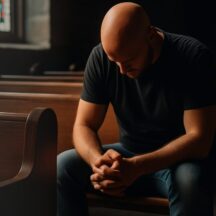I always thought being a good dad meant providing. It meant showing up to work, paying the bills, and giving your kids a better life than you had. And yeah, that’s part of it. But as I sit here now, years into fatherhood, I realize being a dad is less about what you do for your kids and more about who you are with them.
And if I’m honest? There are a lot of days where I don’t feel like I’m enough.
The Distance I Can’t Always Bridge
It hits me in small ways. My daughter, 17, tucked away in her room, earbuds in, scrolling her phone. My son, 12, locked into his video games, headphones on, laughing with his friends online. And me? I’m sitting in the living room like my dad used to—except back then, the living room was where we all gathered. We didn’t have screens in every room. Entertainment was communal.
Now, everyone’s got their own screen, their own world. And I wonder: Am I losing them?
I try to remember what it was like to be their age. I didn’t run to my parents to talk about everything. I didn’t see them as cool. I wanted freedom, not connection. So maybe this is normal.
But still, I want more. I want to be the one they come to. I want to know what’s on their minds. I want to guide them, encourage them, laugh with them. Not as a buddy. As their dad. Their present dad.
And when I don’t feel that connection? I feel like I’m failing.
The Small Moments That Matter
But then something happens. Something small. Something real.
Like my son asking me to play Fortnite with him. It was a moment that could’ve easily slipped by. I had plans with my wife. We were about to sit down, eat dinner, and watch our show. And he walks in, hopeful. “Wanna play a match with me, Dad?”
I wanted to say yes. I didn’t. And even though I chose to honor my time with my wife—something that matters deeply—part of me still felt like I missed a moment.
But the fact that he asked? That sticks with me.
And there’s more.
Like when I taught my daughter to drive. Watching her get nervous, then more confident. Cheering her on. Seeing her become capable. That was a window into the kind of dad I want to be—steady, calm, patient, encouraging.
Or those times driving to a game with my son in the passenger seat, just talking. Or playing chess and letting him figure things out. Or that one photo of the three of us dancing in the car to Panic! At the Disco—goofy, lighthearted, free.
Those moments remind me: I’m showing up. Even if it doesn’t always feel like it.
What Being a “Good Dad” Really Means to Me
When I was younger, I thought being a dad meant being the boss. The disciplinarian. The final say.
But I’ve come to believe something different.
Being a good dad means being available. Being consistent. Being real. It means setting boundaries, but also knowing when to let things go. It means leading with integrity, not ego. And it means loving your kids in a way that doesn’t feel like control, but like covering.
I don’t want to parent from a place of fear. I want to lead with faith.
I want to be the kind of dad who makes our home feel safe, even when the world doesn’t. The kind of dad who tells the truth, even when it’s hard. The kind of dad who says, “I’m proud of you,” before they win. And, “I love you,” even whenthey mess up.
Why I Still Struggle
I have high expectations for myself. I think a lot of us do. And when you grow up without a solid example, it’s easy to swing to extremes.
My stepdad—the one who raised me, the one who wasn’t biologically mine—never reminded me of that fact. He chose to love me. And that stayed with me.
Now I have a daughter who isn’t biologically mine either. But she is, in every way, my daughter. I don’t say “step.” I don’t qualify the relationship. And I hope she never doubts it.
So when I feel like I’m not doing enough—not connecting enough, not providing enough, not being enough—I try to remember that love isn’t about performance. It’s about presence.
The Legacy I’m Trying to Leave
There are a few things I hope my kids say about me one day:
- “He was always there.”
- “He listened.”
- “He believed in me.”
- “He loved Mom.”
- “He wasn’t perfect, but he was real.”
I don’t need to be their hero. I just want to be their dad. The man who showed up, who stayed, who tried. The man who pointed them to Jesus, not by preaching, but by living it out. And when I got it wrong, the man who apologized and tried again.
Why This Article Matters Right Now
Father’s Day isn’t just a celebration. It’s a mirror.
For some, it reflects joy. For others, regret. And for a lot of us, it reflects a strange mix of both.
If you’re reading this and you feel like you’re not doing enough, let me just say: You’re not alone.
You’re not failing if your kids don’t always talk to you.
You’re not failing if you’re tired.
You’re not failing if you’re still figuring it out.
The fact that you care already puts you ahead of the curve.
Keep showing up. Keep asking the questions. Keep trying.
Because the kind of dad you want to be? That’s already in you. You don’t have to be perfect. You just have to be there.
And when your kids look back 30 years from now, they won’t remember everything.
But they will remember how you made them feel.
So give them that.
Even when you don’t feel like enough.
Especially then.
Want to be a more intentional dad—even when life feels overwhelming?
You don’t need to be perfect. You just need to show up.
Grab my free Start Strong Check-In—a 31-day guide to help you reset, refocus, and lead your family with purpose.
Every day gives you:
- One personal reflection
- One Scripture to anchor you
- One simple action step
- One quote to keep you grounded
→ Click here to get the free check-in.
Start building the legacy your kids will remember.












